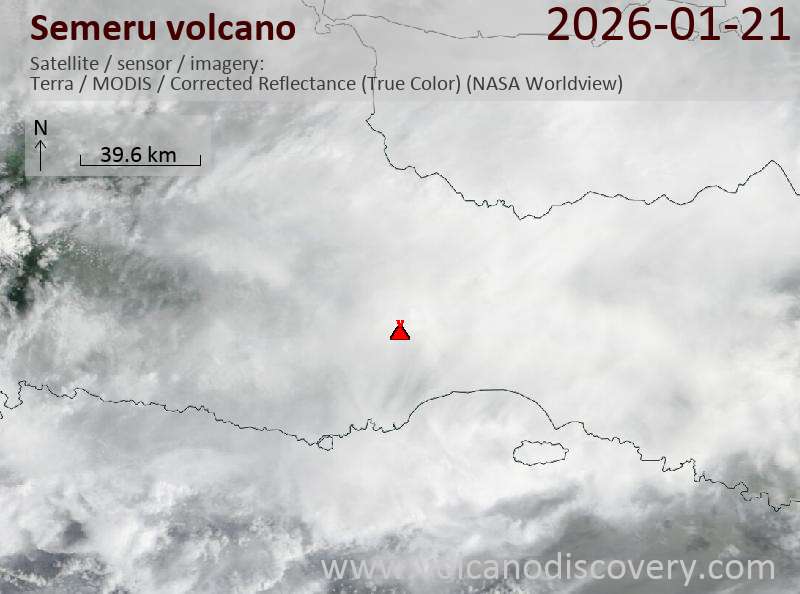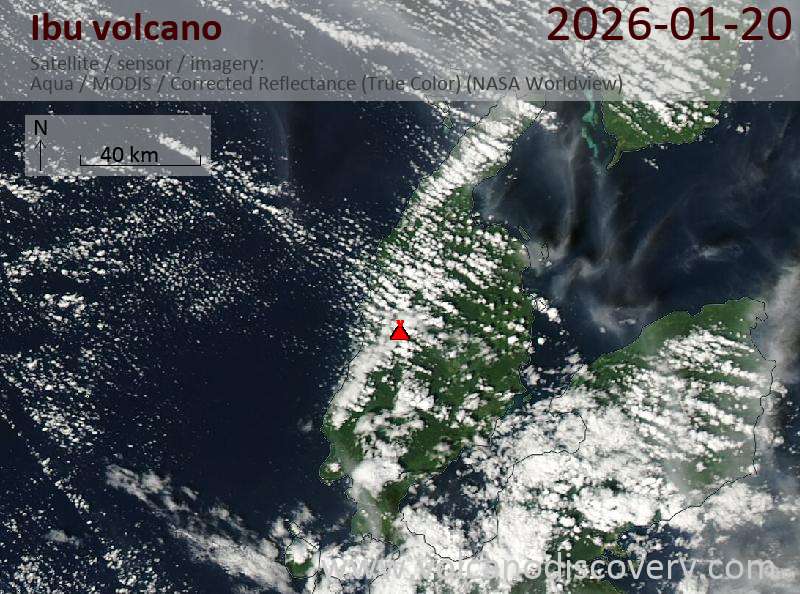A surge at Lewotolok led today’s activity, with 524 explosions and ash-and-gas rising 500 m above the vent. Indonesia dominated overall, as Semeru logged 120 explosions with rockfalls and Ibu tallied 117 explosions, while Ecuador’s Sangay showed increased activity and Mexico’s Popocatepetl stayed active. On Reunion, an alert step to Alert 2-1 was announced at Piton de la Fournaise.
Indonesia
At Lewotolok (Level 3 – Standby), monitors counted 524 explosions and ash-and-gas plumes rose to 500 m above the vent.
Semeru (Level 3 – Standby) produced 120 explosions and five rockfalls, while Ibu (Level 2 – Alert) registered 117 explosions.
Dukono (Level 2 – Alert) also erupted, and Merapi (Level 3 – Standby) released minor gas-and-steam about 20 m above the vent.
Unrest persisted at Awu, Karangetang, and Kerinci, with additional monitoring at Iliwerung and Lokon-Empung.
Raung and Sangeang Api also showed unrest, while Talang and Tangkuban Parahu were reported at normal status.
Philippines
Mayon (Alert Level 3) and Kanlaon (Alert Level 2) remained in ongoing activity. Taal stayed at Alert Level 1.
Mexico
Popocatepetl remained active at Yellow Alert – Phase 2.
South America
In Ecuador, Sangay saw increased eruptive activity, while Reventador continued to erupt.
Peru’s Sabancaya recorded nine earthquakes linked to magmatic-gas movement and showed a thermal anomaly.
Colombia’s Purace remained at Orange Alert with ongoing activity.
Africa
On Reunion Island, Piton de la Fournaise was set to Alert 2-1 at 0000 on 20 January.
Other
In Costa Rica, Poas remained in eruption at Level 2 – Warning. Unrest persisted at Rincon de la Vieja and Turrialba (both Level 2 – Warning).
Source: Smithsonian/USGS Daily Volcanic Activity Report — 20 January 2026.
Activity Summary for 20 January 2026
| Volcano | Country | Activity Type | Keynotes |
|---|---|---|---|
| Dukono | Indonesia | Eruption | 1 seismically detected explosion; eruption ongoing. |
| Ibu | Indonesia | Eruption | 117 explosions; eruption ongoing. |
| Kanlaon | Philippines | Eruption | Eruption ongoing; Alert Level 2 – Moderate Unrest. |
| Lewotolok | Indonesia | Eruption | 524 explosions; ash-and-gas plumes to 500 m; activity increased. |
| Marapi | Indonesia | Eruption | Eruption ongoing; Alert Level 2 – Alert. |
| Mayon | Philippines | Eruption | Eruption ongoing; Alert Level 3 – Increased Tendency Towards Hazardous Eruption. |
| Merapi | Indonesia | Eruption | Minor gas-and-steam plume 20 m above vent. |
| Piton de la Fournaise | France | Alert | Alert 2-1 in effect. |
| Popocatepetl | Mexico | Eruption | Eruption ongoing; Yellow Alert – Phase 2. |
| Poas | Costa Rica | Eruption | Eruption ongoing; Level 2 – Warning. |
| Purace | Colombia | Eruption | Eruption ongoing; Orange Alert. |
| Reventador | Ecuador | Eruption | Eruption ongoing; Alert Level 3 – Orange. |
| Sabancaya | Peru | Eruption | 9 magmatic-gas earthquakes; thermal anomaly; eruption ongoing. |
| Sangay | Ecuador | Eruption | Eruptive activity increased. |
| Semeru | Indonesia | Eruption | 120 explosions; 5 rockfalls; eruption ongoing. |
| Taal | Philippines | Eruption | Eruption ongoing; Alert Level 1 – Low-Level Unrest. |
| Awu | Indonesia | Unrest | Ongoing unrest; Alert Level 2 – Alert. |
| Bur ni Telong | Indonesia | Unrest | Ongoing unrest; Alert Level 2 – Alert. |
| Iliwerung | Indonesia | Unrest | Ongoing unrest; Alert Level 2 – Alert. |
| Karangetang | Indonesia | Unrest | Ongoing unrest; Alert Level 2 – Alert. |
| Kerinci | Indonesia | Unrest | Ongoing unrest; Alert Level 2 – Alert. |
| Lewotobi | Indonesia | Unrest | Gas-and-steam plume to 50 m; ongoing unrest. |
| Lokon-Empung | Indonesia | Unrest | Ongoing unrest; Alert Level 2 – Alert. |
| Raung | Indonesia | Unrest | Ongoing unrest; Alert Level 2 – Alert. |
| Rincon de la Vieja | Costa Rica | Unrest | Ongoing unrest; Level 2 – Warning. |
| Sangeang Api | Indonesia | Unrest | Ongoing unrest; Alert Level 2 – Alert. |
| Turrialba | Costa Rica | Unrest | Ongoing unrest; Level 2 – Warning. |
| Talang | Indonesia | Background | Background activity; Level 1 – Normal. |
| Tangkuban Parahu | Indonesia | Background | Background activity; Level 1 – Normal. |



